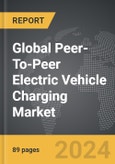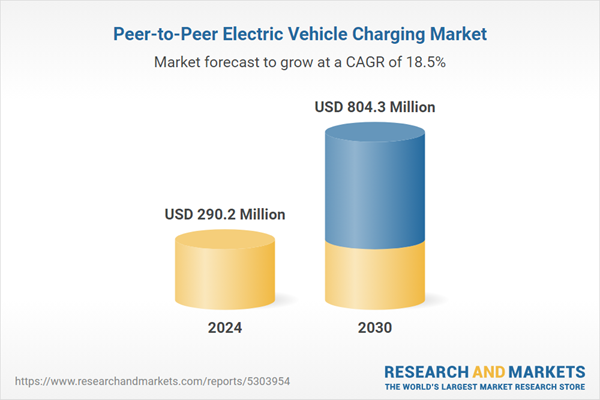Global Peer-To-Peer Electric Vehicle Charging Market - Key Trends & Drivers Summarized
How Has the Peer-To-Peer Electric Vehicle Charging Market Evolved Over the Years?
The peer-to-peer (P2P) electric vehicle (EV) charging market has emerged as a dynamic segment within the broader EV infrastructure landscape, largely driven by the rising adoption of electric vehicles and the need for more accessible and distributed charging solutions. Traditionally, EV charging infrastructure has been dominated by centralized networks operated by utilities, governments, or private companies. However, the rapid growth in EV ownership, coupled with limited access to public charging stations in certain areas, has created demand for more flexible and decentralized options. Peer-to-peer EV charging networks have evolved in response to this, allowing private EV owners or businesses to share their charging infrastructure with other EV drivers, often through apps or platforms that connect hosts and users.This concept of shared charging infrastructure aligns well with the broader trend of the sharing economy, similar to ride-sharing or home-sharing models. Early iterations of the P2P charging market were largely grassroots efforts, with EV owners installing home chargers and offering them for public use, often in areas with limited public infrastructure. As the market has matured, several platforms have emerged that provide a streamlined, user-friendly experience, allowing hosts to set pricing, monitor energy usage, and manage bookings for their charging stations. The market continues to grow, spurred by technological advancements in charging technology, platform connectivity, and increased consumer awareness about the environmental and economic benefits of sharing resources.
How Are Technological Advancements Shaping the Peer-To-Peer EV Charging Market?
Technological advancements are significantly shaping the development and growth of the peer-to-peer EV charging market, making it more efficient, accessible, and scalable. One of the key technological innovations has been the integration of smart charging solutions into P2P platforms. These systems allow charging stations to connect to the internet, enabling real-time monitoring of energy usage, remote management, and dynamic pricing based on demand or time-of-day tariffs. This not only provides transparency for both hosts and users but also enhances the user experience by ensuring that stations are available and functional when needed.The rise of blockchain technology has also introduced new possibilities for the P2P EV charging market. Blockchain enables decentralized and secure transactions, ensuring trust between parties in peer-to-peer networks without the need for intermediaries. It also allows for automated processes through smart contracts, where payments and energy consumption data can be recorded transparently and securely. Blockchain technology could further facilitate cross-border charging, creating a seamless experience for EV drivers traveling internationally while ensuring fair compensation for charging hosts.
Mobile applications
and cloud-based platforms have been crucial in connecting EV drivers to available charging stations. Through mobile apps, users can locate nearby charging points, check availability, book a slot, and make payments, all from their smartphones. These platforms often integrate mapping services and real-time data, providing users with precise information about the location, price, and energy output of a particular charger. Additionally, as the concept of vehicle-to-grid (V2G) technology continues to evolve, it could further enhance the P2P charging model. V2G allows EVs to not only charge from the grid but also supply electricity back to the grid during peak demand periods, enabling hosts and users to participate in energy trading and grid balancing.How Is Changing Consumer Behavior Affecting the Peer-To-Peer EV Charging Market?
Changing consumer behavior, particularly the rise of shared economies and the increasing adoption of electric vehicles, has been instrumental in shaping the peer-to-peer EV charging market. As more consumers become environmentally conscious and seek sustainable transportation options, the demand for electric vehicles has surged globally. However, the growth in EV ownership has not always been matched by the expansion of public charging infrastructure, leading to challenges in accessing charging stations, especially in residential areas or regions with underdeveloped charging networks. This gap has made the P2P EV charging model an attractive option for both EV owners and charging hosts.The concept of resource sharing, which has gained popularity through platforms like Airbnb and Uber, is increasingly influencing the way consumers think about EV charging. Many EV owners, particularly those in suburban or urban areas, are willing to share their private home charging stations to help fellow EV drivers, while also earning some passive income. The convenience of using existing residential or commercial infrastructure to provide charging services is appealing to both hosts and users, reducing the need for large-scale investments in public charging stations.
Moreover, consumer expectations around convenience and accessibility have driven the development of user-friendly P2P platforms that allow EV drivers to find and book charging stations with ease. Flexibility is a key factor influencing consumer behavior in this market. Drivers often prefer the ability to charge their vehicles at various locations - whether it's at a private residence, a workplace, or a commercial establishment - rather than relying solely on traditional charging networks. This demand for greater accessibility and control over where and when to charge has led to increased adoption of P2P charging solutions.
What Factors Are Driving the Growth of the Peer-To-Peer EV Charging Market?
The growth of the peer-to-peer EV charging market is driven by several key factors, including the rise in electric vehicle ownership, advancements in technology, and the increasing need for accessible and decentralized charging infrastructure. One of the primary drivers is the growing adoption of electric vehicles worldwide, driven by government incentives, stricter emissions regulations, and consumer interest in sustainable transportation. As more people purchase EVs, the demand for flexible and accessible charging solutions has increased, particularly in areas where public charging infrastructure is limited. Another important driver is technological innovation. The development of smart charging solutions, blockchain-based payment systems, and user-friendly mobile applications has made it easier for hosts and users to participate in P2P charging networks. These technologies provide transparency, security, and convenience, making the process of finding, booking, and paying for a charging session more seamless. Additionally, the integration of dynamic pricing models allows hosts to adjust prices based on demand, energy costs, and time of day, which incentivizes more participation in the P2P market.Urbanization and the shift towards sustainable living are also playing a significant role in the expansion of the P2P EV charging market. As cities become more congested and environmental concerns rise, urban residents are increasingly opting for electric vehicles. However, many of these consumers do not have access to private garages or dedicated charging stations, leading them to seek out shared charging options in their neighborhoods. The peer-to-peer model allows for the utilization of existing infrastructure in residential areas, offices, and public spaces, providing a more distributed and accessible charging network. Lastly, government policies promoting clean energy and the development of electric vehicle infrastructure have contributed to the growth of the P2P EV charging market. Many governments are offering incentives for the installation of EV chargers in homes and businesses, as well as encouraging the use of renewable energy sources for charging. These initiatives not only support the growth of the EV market but also create opportunities for P2P charging networks to thrive. The combination of rising EV adoption, technological advancements, and supportive policies ensures that the peer-to-peer EV charging market will continue to grow in the coming years.
Report Scope
The report analyzes the Peer-To-Peer Electric Vehicle Charging market, presented in terms of market value (US$ Thousand). The analysis covers the key segments and geographic regions outlined below.- Segments: Type (Level 1, Level 2); Application (Residential, Commercial).
- Geographic Regions/Countries:World; United States; Canada; Japan; China; Europe (France; Germany; Italy; United Kingdom; and Rest of Europe); Asia-Pacific; Rest of World.
Key Insights:
- Market Growth: Understand the significant growth trajectory of the Level 1 Charging segment, which is expected to reach US$182.3 Million by 2030 with a CAGR of a 15.1%. The Level 2 Charging segment is also set to grow at 19.7% CAGR over the analysis period.
Why You Should Buy This Report:
- Detailed Market Analysis: Access a thorough analysis of the Global Peer-To-Peer Electric Vehicle Charging Market, covering all major geographic regions and market segments.
- Competitive Insights: Get an overview of the competitive landscape, including the market presence of major players across different geographies.
- Future Trends and Drivers: Understand the key trends and drivers shaping the future of the Global Peer-To-Peer Electric Vehicle Charging Market.
- Actionable Insights: Benefit from actionable insights that can help you identify new revenue opportunities and make strategic business decisions.
Key Questions Answered:
- How is the Global Peer-To-Peer Electric Vehicle Charging Market expected to evolve by 2030?
- What are the main drivers and restraints affecting the market?
- Which market segments will grow the most over the forecast period?
- How will market shares for different regions and segments change by 2030?
- Who are the leading players in the market, and what are their prospects?
Report Features:
- Comprehensive Market Data: Independent analysis of annual sales and market forecasts in US$ Million from 2024 to 2030.
- In-Depth Regional Analysis: Detailed insights into key markets, including the U.S., China, Japan, Canada, Europe, Asia-Pacific, Latin America, Middle East, and Africa.
- Company Profiles: Coverage of players such as AeroVironment, Inc., ChargePoint, Inc., ClipperCreek, Inc., Enel X, EV Meter and more.
- Complimentary Updates: Receive free report updates for one year to keep you informed of the latest market developments.
Some of the 34 companies featured in this Peer-To-Peer Electric Vehicle Charging market report include:
- AeroVironment, Inc.
- ChargePoint, Inc.
- ClipperCreek, Inc.
- Enel X
- EV Meter
- EVBox
- Greenlots
- Innogy
- IONITY
- Power Hero
This edition integrates the latest global trade and economic shifts into comprehensive market analysis. Key updates include:
- Tariff and Trade Impact: Insights into global tariff negotiations across 180+ countries, with analysis of supply chain turbulence, sourcing disruptions, and geographic realignment. Special focus on 2025 as a pivotal year for trade tensions, including updated perspectives on the Trump-era tariffs.
- Adjusted Forecasts and Analytics: Revised global and regional market forecasts through 2030, incorporating tariff effects, economic uncertainty, and structural changes in globalization. Includes historical analysis from 2015 to 2023.
- Strategic Market Dynamics: Evaluation of revised market prospects, regional outlooks, and key economic indicators such as population and urbanization trends.
- Innovation & Technology Trends: Latest developments in product and process innovation, emerging technologies, and key industry drivers shaping the competitive landscape.
- Competitive Intelligence: Updated global market share estimates for 2025, competitive positioning of major players (Strong/Active/Niche/Trivial), and refined focus on leading global brands and core players.
- Expert Insight & Commentary: Strategic analysis from economists, trade experts, and domain specialists to contextualize market shifts and identify emerging opportunities.
Table of Contents
Companies Mentioned (Partial List)
A selection of companies mentioned in this report includes, but is not limited to:
- AeroVironment, Inc.
- ChargePoint, Inc.
- ClipperCreek, Inc.
- Enel X
- EV Meter
- EVBox
- Greenlots
- Innogy
- IONITY
- Power Hero
Table Information
| Report Attribute | Details |
|---|---|
| No. of Pages | 130 |
| Published | February 2026 |
| Forecast Period | 2024 - 2030 |
| Estimated Market Value ( USD | $ 290.2 Million |
| Forecasted Market Value ( USD | $ 804.3 Million |
| Compound Annual Growth Rate | 18.5% |
| Regions Covered | Global |









